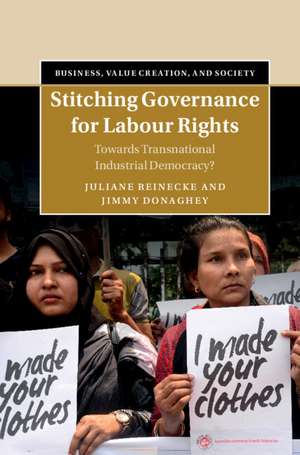Stitching Governance for Labour Rights: Towards Transnational Industrial Democracy?: Business, Value Creation, and Society
Autor Juliane Reinecke, Jimmy Donagheyen Limba Engleză Hardback – 15 mar 2023
| Toate formatele și edițiile | Preț | Express |
|---|---|---|
| Paperback (1) | 229.95 lei 22-36 zile | +14.30 lei 5-11 zile |
| Cambridge University Press – 22 aug 2024 | 229.95 lei 22-36 zile | +14.30 lei 5-11 zile |
| Hardback (1) | 698.46 lei 43-57 zile | |
| Cambridge University Press – 15 mar 2023 | 698.46 lei 43-57 zile |
Din seria Business, Value Creation, and Society
-
 Preț: 284.01 lei
Preț: 284.01 lei -
 Preț: 229.95 lei
Preț: 229.95 lei -
 Preț: 284.01 lei
Preț: 284.01 lei -
 Preț: 330.80 lei
Preț: 330.80 lei -
 Preț: 358.30 lei
Preț: 358.30 lei -
 Preț: 309.19 lei
Preț: 309.19 lei -
 Preț: 302.61 lei
Preț: 302.61 lei -
 Preț: 338.80 lei
Preț: 338.80 lei -
 Preț: 285.54 lei
Preț: 285.54 lei -
 Preț: 298.97 lei
Preț: 298.97 lei -
 Preț: 296.72 lei
Preț: 296.72 lei -
 Preț: 285.16 lei
Preț: 285.16 lei -
 Preț: 282.65 lei
Preț: 282.65 lei -
 Preț: 320.17 lei
Preț: 320.17 lei -
 Preț: 220.95 lei
Preț: 220.95 lei - 11%
 Preț: 640.98 lei
Preț: 640.98 lei -
 Preț: 322.29 lei
Preț: 322.29 lei
Preț: 698.46 lei
Preț vechi: 812.16 lei
-14% Nou
Puncte Express: 1048
Preț estimativ în valută:
133.69€ • 145.27$ • 112.37£
133.69€ • 145.27$ • 112.37£
Carte tipărită la comandă
Livrare economică 21 aprilie-05 mai
Preluare comenzi: 021 569.72.76
Specificații
ISBN-13: 9781108486873
ISBN-10: 1108486878
Pagini: 220
Dimensiuni: 152 x 229 x 18 mm
Greutate: 0.54 kg
Editura: Cambridge University Press
Colecția Cambridge University Press
Seria Business, Value Creation, and Society
Locul publicării:Cambridge, United Kingdom
ISBN-10: 1108486878
Pagini: 220
Dimensiuni: 152 x 229 x 18 mm
Greutate: 0.54 kg
Editura: Cambridge University Press
Colecția Cambridge University Press
Seria Business, Value Creation, and Society
Locul publicării:Cambridge, United Kingdom
Cuprins
1. Introduction; 2. The democratic deficit of global supply chains; 3. Democratic representation: structures and claims; 4. After Rana Plaza: mending a toxic supply chain; 5. Representative alliances in the creation of the Bangladesh Accord; 6. Creating representation through industrial democracy vs. CSR: the Accord and Alliance as a natural experiment; 7. When transnational governance meets national actors: The politics of exclusion in the Bangladesh Accord; 8. Building representative structures at the workplace level; 9. Conclusions: the emergence of transnational industrial democracy?; Appendix 1. The practical and political issues of studying transnational labour representation; Appendix 2. When CSR meets industrial relations: reflections on doing interdisciplinary scholarship.
Recenzii
'Through their detailed empirical work on the ground in Bangladesh and their thoughtful theorising on democratic representation, the authors show that what seems like an unsolveable problem - achieving better labour standards in the global garment industry - hinges on one core ingredient: the voice of workers. Their book sheds light on who can legitimately take up this role in the absence of institutionalised structures of representation, taking us through the complex and fragile alliances on different levels that have emerged in the aftermath of the Rana Plaza disaster. A great read for anyone interested in the intricacies of making global supply chains more sustainable, be it from an industrial relations, a governance or a management perspective.' Elke Schüßler, Head of Institute of Organizational Science, Johannes Kepler University Linz
'Workers have a right to stay alive at work. Unforgivably, it seems that the global brands that now dominate the world economy only 'woke up' to this fundamental right when over a thousand workers died in the Rana Plaza factory collapse. This book is a wake-up call for everyone, from international agencies to national governments, from producers to consumers. Reinecke and Donaghey demonstrate how production and consumption relations have been 'disconnected' by global supply chains, and they make a compelling democratic case for these relations to be 'stitched back together'. Although the market-driven form of industrial democracy that characterised the Accord ultimately fell short, this book is an essential read for all those who are trying to stitch national and international labour regulation back together.' Peter Turnbull, Professor of Management & Industrial Relations, University of Bristol, UK, and President, British Universities Industrial Relations Association (BUIRA)
'Workers have a right to stay alive at work. Unforgivably, it seems that the global brands that now dominate the world economy only 'woke up' to this fundamental right when over a thousand workers died in the Rana Plaza factory collapse. This book is a wake-up call for everyone, from international agencies to national governments, from producers to consumers. Reinecke and Donaghey demonstrate how production and consumption relations have been 'disconnected' by global supply chains, and they make a compelling democratic case for these relations to be 'stitched back together'. Although the market-driven form of industrial democracy that characterised the Accord ultimately fell short, this book is an essential read for all those who are trying to stitch national and international labour regulation back together.' Peter Turnbull, Professor of Management & Industrial Relations, University of Bristol, UK, and President, British Universities Industrial Relations Association (BUIRA)
Notă biografică
Descriere
This book shows how the Rana Plaza disaster led to voluntary labour governance initiatives based on a model of transnational industrial democracy.
